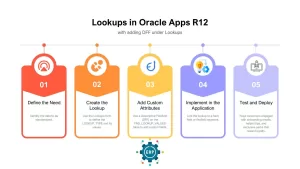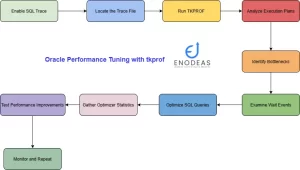
Automated Solutions with EBS(Oracle e-Business Suite)
In today’s dynamic business landscape, the quest for operational efficiency and growth is relentless. Look no further than automated solutions with Oracle EBS (e-Business Suite), an ERP(enterprise resource planning) solution, a transformative force revolutionizing business operations. This article explores how automated solutions with EBS simplify tasks, enhance efficiency, and foster business expansion.
Table of Contents
Unleashing Efficiency with EBS Automation
Data Extraction and Transformation for Custom Reporting
Driving Business Growth with EBS Automation
Automating Data Synchronization with External Systems
Real Case Study: Custom Data Validation and Alerting
Key Features and Functionalities of EBS Automated Solutions
Implementing EBS Automation in Your Business
Best Practices for Maximizing EBS Automated Solutions
Overcoming Challenges with EBS Automation
Integrating EBS with Other Business Tools and Systems
Implementing Python-Enhanced EBS Automation in Your Business
Unleashing Efficiency with EBS Automation
Oracle EBS empowers businesses by automating repetitive tasks, eliminating manual errors, and freeing up resources for strategic endeavors. From inventory management to financial reporting and customer relationship management, EBS offers a versatile suite tailored to diverse business needs. Advanced analytics provide valuable insights, enabling data-driven decisions that propel business performance.
Use Case 1: Automated Data Extraction and Transformation for Custom Reporting
- Scenario: A business requires custom reports that involve complex data transformations from EBS data.
- Python Solution: Use Python libraries like oracledb(cx_oracle) to connect to the EBS database, extract data, transform it using pandas, and generate reports in formats like Excel or PDF using openpyxl or reportlab.
- Benefit: Reduced manual effort in data preparation, faster report generation, and more flexible reporting capabilities.
Driving Business Growth with EBS Automation
Automated solutions with EBS play a pivotal role in fostering business growth. By automating routine tasks, employees can channel their efforts into innovation, customer acquisition, and market expansion. Improved operational efficiency translates to cost reduction and increased productivity, supporting profitability and investment in growth initiatives.
Moreover, EBS provides a competitive edge through advanced analytics, offering insights into customer behavior, market trends, and industry benchmarks. These insights inform targeted marketing strategies and enhance customer experiences, contributing to sustained business growth.
Use Case 2: Automating Data Synchronization with External Systems
- Scenario: A company needs to synchronize data between EBS and an external CRM or e-commerce platform.
- Python Solution: Develop Python scripts using libraries like requests or specific API client libraries to interact with the external systems’ APIs and cx_oracle to interact with EBS. This allows for automated data transfer and synchronization.
- Benefit: Real-time data consistency across systems, reduced manual data entry, and improved data accuracy.
Real Case Study: Custom Data Validation and Alerting
A large retail company used Python to create custom data validation scripts that checked the consistency of inventory data within EBS. The python script would then generate alerts via email using smtplib when discrepancies were detected.
- Result: Significantly reduced inventory errors, prevented stockouts, and improved order fulfillment accuracy.
Key Features and Functionalities of EBS Automated Solutions
Oracle EBS boasts a comprehensive toolkit, featuring:
- Workflow Automation: Streamlining processes and improving efficiency.
- Inventory Management: Real-time visibility into inventory levels for optimized order fulfillment.
- Financial Reporting: Accurate financial reports, budget management, and tracking key metrics.
- Customer Relationship Management: Centralized customer data, automated segmentation, and personalized experiences.
- Analytics and Reporting: Insightful business performance metrics and data-driven decision-making.
- Integration Capabilities: Seamless integration with other business tools for improved data flow and collaboration.
- Scalability: Effortless scalability to handle growing business operations.
Example: Automated Invoice Processing with Python
- Python can be used to automate the process of extracting invoice data from EBS, validating it, and generating PDF invoices.
- The python script can then email/transfer the invoices to customers/remote directory.
Implementing EBS Automation in Your Business
Implementing automated solutions with EBS necessitates careful planning:
- Assess your business needs: Identify the areas of your business that can benefit from automation and determine the specific functionalities required.
- Select the right EBS solution: Evaluate different EBS solutions based on your business requirements, scalability, integration capabilities, and ease of use.
- Design workflows: Map out your existing processes and design workflows that will be automated using EBS. Consider the input, output, and decision points in each process.
- Configure and customize: Configure the EBS solution to align with your specific business requirements. Customize workflows, data fields, and reporting structures to ensure optimal performance.
- Train your team: Provide comprehensive training to your employees on how to use the EBS solution effectively. Ensure they understand the benefits and are comfortable with the new processes.
- Test and refine: Conduct thorough testing of the automated processes and workflows to identify any issues or areas for improvement. Refine the setup based on feedback and user experience.
- Monitor and optimize: Continuously monitor the performance of the automated processes and workflows. Use the analytics and reporting capabilities of EBS to identify areas for optimization and make data-driven improvements.
Best Practices for Maximizing EBS Automated Solutions
To maximize the benefits of using automated solutions with EBS, consider the following best practices::
- Start Small-Scale Automation: Begin by automating smaller processes or workflows to gain confidence and identify any challenges before scaling up.
- Involve Stakeholders: Engage key stakeholders throughout the implementation process to ensure their buy-in and support
- Regularly Review and Optimize: Continuously review and optimize your automated workflows to ensure they align with your evolving business needs.
- Train and Empower Your Team: Provide ongoing training and support to your team to ensure they can effectively leverage the automated solutions with EBS.
- Stay Updated: Keep abreast of the latest updates and new features of EBS to take advantage of emerging functionalities that can further drive business growth.
Overcoming Challenges with EBS Automation
While EBS automation brings immense benefits, challenges may arise:
- Resistance to Change: Some employees may resist adopting new processes and technologies. To overcome this, provide comprehensive training, communicate the benefits, and involve employees in the implementation process.
- Integration Complexities: Integrating EBS with existing business tools and systems may pose challenges. Work closely with your IT team or consultants to ensure a smooth integration process.
- Data Quality and Accuracy: Ensuring data quality and accuracy is crucial for effective automation. Implement data validation checks, establish data governance processes, and regularly audit data to maintain its integrity.
- Scalability Limitations: EBS solutions may have scalability limitations. Before implementing, ensure that the chosen solution can handle your expected growth and workload. Consider future business needs and scalability requirements.
- Security and Data Privacy: Protecting sensitive data is paramount. Implement robust security measures, such as encryption, access controls, and regular data backups, to safeguard your business information.
Integrating EBS with Other Business Tools and Systems
Integrating EBS with other tools enhances efficiency:
- CRM integration: Integrate EBS with your customer relationship management (CRM) system to ensure a unified view of customer data and enable seamless communication between sales, marketing, and customer service teams.
- Accounting system integration: Connect EBS with your accounting system to automate financial processes, such as invoicing, payment reconciliation, and financial reporting.
- E-commerce platform integration: Integrate EBS with your e-commerce platform to automate order processing, inventory management, and shipping, ensuring a seamless customer experience.
- Project management system integration: Connect EBS with your project management system to streamline project workflows, resource allocation, and project profitability tracking.
- Analytics and reporting tools integration: Integrate EBS with analytics and reporting tools to consolidate data from different sources and gain comprehensive insights into your business performance.
Implementing Python-Enhanced EBS Automation in Your Business
Implementing Python-enhanced EBS automation requires a structured approach:
- Identify Automation Opportunities: Pinpoint areas where Python can complement EBS’s capabilities (e.g., Business critial Concurrent Program, Concurrent Manager, Exporting data from ebs, email monitoring).
- Develop Custom Scripts: Design and develop Python scripts to automate specific tasks and workflows.
- Integrate with EBS: Use Python libraries to connect to the EBS database and interact with its data.
- Test and Deploy: Thoroughly test the scripts and deploy them in a production environment.
- Maintain and Update: Regularly maintain and update the scripts to ensure compatibility and efficiency.
The Future of EBS Automated Solutions
As technology evolves, so will EBS capabilities, providing businesses with more opportunities to automate and optimize operations. The future promises simplified processes, reduced costs, and sustained growth through the strategic integration of EBS.
In conclusion, businesses embracing automated solutions with EBS position themselves to thrive in today’s fast-paced environment. So, seize the power of automation with Oracle EBS and witness your business ascend to new heights of success.




Pingback: Mastering Active Session History: Best Queries & Practices
Pingback: Oracle EBS Efficiency using Python Automation(python and Oracle)